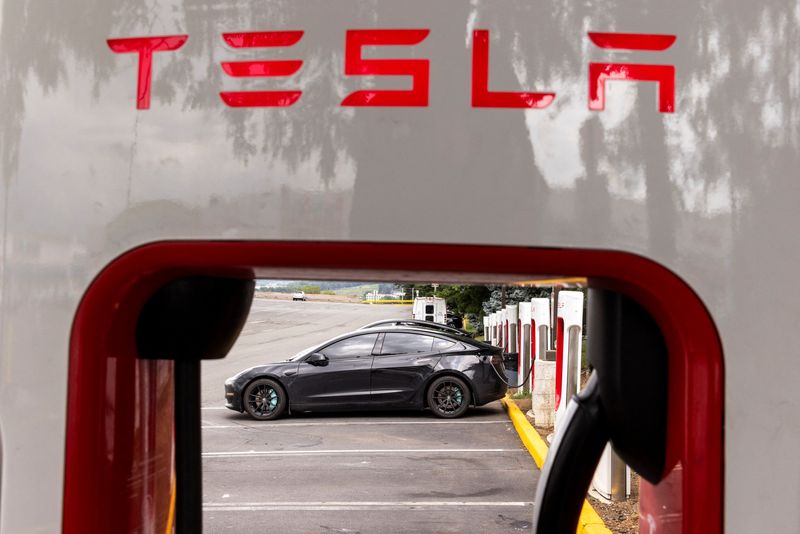By David Shepardson and Akash Sriram
(Reuters) -Tesla’s electric vehicles likely would not qualify for California’s new state tax credits under a proposal in the works if President-elect Donald Trump scraps the federal tax credit for EV purchases, Governor Gavin Newsom’s office said on Monday.
Tesla (NASDAQ:) shares closed down 4% to $338.59 and fell another 1.2% in after hours trading.
Trump’s transition team is considering eliminating the federal tax credit of $7,500 for EV purchases, Reuters reported this month.
Tesla CEO Elon Musk, a close Trump adviser, sharply criticized the idea of barring the automaker from EV subsidies writing on X in response “Even though Tesla is the only company who manufactures their EVs in California! This is insane.”
Musk has said he supports ending subsidies for EVs, oil and gas.
Newsom said on Monday that if Trump eliminates a federal EV tax credit, he will propose creating a new version of the state’s Clean Vehicle Rebate Program that ended in 2023 and spent $1.49 billion to subsidize more than 594,000 vehicles.
“The governor’s proposal for ZEV rebates, and any potential market cap, is subject to negotiation with the legislature. Any potential market cap would be intended to foster market competition, innovation and to support new market entrants,” his office said.
The state faces financial headwinds. California faces a $2 billion budget deficit next year, a non-partisan legislative estimate said last week.
EVs account for 22% of California sales – or 293,000 through Sept. 30 – and it is unclear how much the state program would cost and if it would include the federal $4,000 tax credit for used EVs and impose the same limits on income and vehicle price.
California provided up to $7,500 for the purchase or lease of a new plug-in hybrid, battery or fuel cell EV and could potentially be paid for by the Greenhouse Gas Reduction Fund which is funded by polluters under the state’s cap-and-trade program.
Musk and Newsom have clashed over state policies such as shutting Tesla’s Fremont factory during the pandemic and California’s approval of a bill on transgender kids.
In 2021, Tesla moved its headquarters from California to Texas, and Musk said this year that his other companies such as SpaceX and social media platform X will follow suit.
California has crossed the 2 million mark for sales of zero-emission vehicles, doubling total sales since 2022.

Last month, a California official said he expects the Environmental Protection Agency to approve the state’s plan to halt the sale of gasoline-only vehicles by 2035, a proposal that major automakers have met with skepticism.
California’s rules, which have been adopted by a dozen other states, require 80% of all new vehicles sold in the state be electric by 2035 and no more than 20% plug-in hybrid electric.

